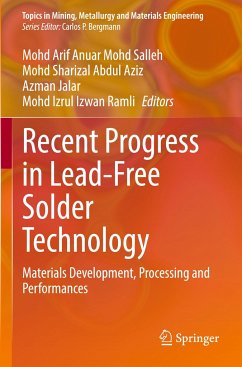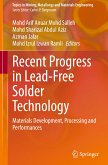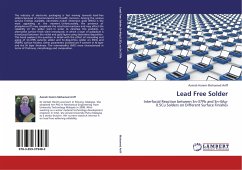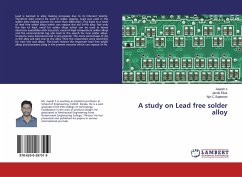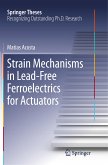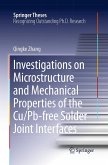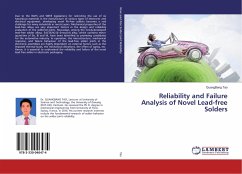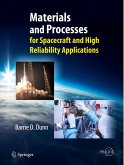Recent Progress in Lead-Free Solder Technology
Materials Development, Processing and Performances
Herausgegeben:Salleh, Mohd Arif Anuar Mohd; Abdul Aziz, Mohd Sharizal; Jalar, Azman; Izwan Ramli, Mohd Izrul
Recent Progress in Lead-Free Solder Technology
Materials Development, Processing and Performances
Herausgegeben:Salleh, Mohd Arif Anuar Mohd; Abdul Aziz, Mohd Sharizal; Jalar, Azman; Izwan Ramli, Mohd Izrul
- Broschiertes Buch
- Merkliste
- Auf die Merkliste
- Bewerten Bewerten
- Teilen
- Produkt teilen
- Produkterinnerung
- Produkterinnerung
This book highlights recent research progress in lead (Pb)-free solder technology, focusing on materials development, processing, and performances. It discusses various Pb-free solder materials' development, encompassing composite solders, transient liquid phase sintering, and alloying. The book also details various Pb-free solder technology processing and performances, including flux modification for soldering, laser soldering, wave soldering, and reflow soldering, while also examining multiple technologies pertaining to the rigid and flexible printed circuit board (PCB). Some chapters…mehr
Andere Kunden interessierten sich auch für
![Recent Progress in Lead-Free Solder Technology Recent Progress in Lead-Free Solder Technology]() Recent Progress in Lead-Free Solder Technology131,99 €
Recent Progress in Lead-Free Solder Technology131,99 €![Lead Free Solder Lead Free Solder]() Azmah Hanim Mohamed AriffLead Free Solder51,99 €
Azmah Hanim Mohamed AriffLead Free Solder51,99 €![A study on Lead free solder alloy A study on Lead free solder alloy]() Jayesh sA study on Lead free solder alloy27,99 €
Jayesh sA study on Lead free solder alloy27,99 €![Strain Mechanisms in Lead-Free Ferroelectrics for Actuators Strain Mechanisms in Lead-Free Ferroelectrics for Actuators]() Matias AcostaStrain Mechanisms in Lead-Free Ferroelectrics for Actuators77,99 €
Matias AcostaStrain Mechanisms in Lead-Free Ferroelectrics for Actuators77,99 €![Investigations on Microstructure and Mechanical Properties of the Cu/Pb-free Solder Joint Interfaces Investigations on Microstructure and Mechanical Properties of the Cu/Pb-free Solder Joint Interfaces]() Qingke ZhangInvestigations on Microstructure and Mechanical Properties of the Cu/Pb-free Solder Joint Interfaces39,99 €
Qingke ZhangInvestigations on Microstructure and Mechanical Properties of the Cu/Pb-free Solder Joint Interfaces39,99 €![Reliability and Failure Analysis of Novel Lead-free Solders Reliability and Failure Analysis of Novel Lead-free Solders]() QuangBang TaoReliability and Failure Analysis of Novel Lead-free Solders38,99 €
QuangBang TaoReliability and Failure Analysis of Novel Lead-free Solders38,99 €![Materials and Processes Materials and Processes]() Barrie D. DunnMaterials and Processes194,99 €
Barrie D. DunnMaterials and Processes194,99 €-
-
-
This book highlights recent research progress in lead (Pb)-free solder technology, focusing on materials development, processing, and performances. It discusses various Pb-free solder materials' development, encompassing composite solders, transient liquid phase sintering, and alloying. The book also details various Pb-free solder technology processing and performances, including flux modification for soldering, laser soldering, wave soldering, and reflow soldering, while also examining multiple technologies pertaining to the rigid and flexible printed circuit board (PCB). Some chapters explain the materials characterization and modeling techniques using computational fluid dynamics (CFD). This book serves as a valuable reference for researchers, industries, and stakeholders in advanced microelectronic packaging, emerging interconnection technology, and those working on Pb-free solder.
Produktdetails
- Produktdetails
- Topics in Mining, Metallurgy and Materials Engineering
- Verlag: Springer / Springer International Publishing / Springer, Berlin
- Artikelnr. des Verlages: 978-3-030-93443-9
- 1st edition 2022
- Seitenzahl: 340
- Erscheinungstermin: 3. März 2023
- Englisch
- Abmessung: 235mm x 155mm x 19mm
- Gewicht: 517g
- ISBN-13: 9783030934439
- ISBN-10: 3030934438
- Artikelnr.: 67399382
- Herstellerkennzeichnung Die Herstellerinformationen sind derzeit nicht verfügbar.
- Topics in Mining, Metallurgy and Materials Engineering
- Verlag: Springer / Springer International Publishing / Springer, Berlin
- Artikelnr. des Verlages: 978-3-030-93443-9
- 1st edition 2022
- Seitenzahl: 340
- Erscheinungstermin: 3. März 2023
- Englisch
- Abmessung: 235mm x 155mm x 19mm
- Gewicht: 517g
- ISBN-13: 9783030934439
- ISBN-10: 3030934438
- Artikelnr.: 67399382
- Herstellerkennzeichnung Die Herstellerinformationen sind derzeit nicht verfügbar.
Mohd Arif Anuar Mohd Salleh (Ph.D.) is an associate professor of materials engineering at the Faculty of Chemical Engineering Technology, Universiti Malaysia Perlis. He graduated with a B.Eng (Hons) in Mechanical Engineering, followed by M.Eng in Mechanical Engineering majoring in Materials at the Universiti Tun Hussein Onn Malaysia. He received his Ph.D. from the University of Queensland, Australia, in Materials Engineering, specializing in the development of advanced solder materials. He is also a certified Professional Engineer and a corporate member of the Institute of Engineers, Malaysia (IEM). He is currently the Chairman of Tin Solder Technology Research Malaysia under the Tin Industry Board (Research and Development), Malaysia. He worked in and lectured on the subject of electronic packaging materials for more than 14 years. Before joining Universiti Malaysia Perlis, he was employed as a Failure Analysis Engineer at Intel Malaysia. He also worked part-time researchofficer for a few research projects on solder materials development at the University of Queensland Australia (2013-2015) and Imperial College London (2015). He has published more than 190 articles, encompassing proceedings, journals, books, and modules as primary author and co-author, and has an H-index of 16. His research endeavors were significant and impactful, as reflected in his receiving grants worth RM5.5 million. Mohd Sharizal Abdul Aziz (Ph.D) received the B.Eng, M.Sc., and Ph.D. degrees from the Universiti Sains Malaysia, in 2006, 2012, and 2015. In June 2016, he became a Senior Lecturer at the School of Mechanical Engineering, Engineering Campus, Universiti Sains Malaysia, Penang, Malaysia. Sharizal is the author or co-author of more than 100 papers in the international journal, book chapter, and conference proceeding with the current H-index 9. He has given numerous invited/ keynote talks at international conferences. Sharizal also organizedworkshops on Soldering & SMT processes for academics and professionals in collaboration with the microelectronics industries in Malaysia. His research interest in Thermofluids and Computational Fluid Dynamics, focusing on Soldering, Surface Mount Technology, and Advanced Packaging. He also registered with the Board of Engineers Malaysia and a fellow Electronics Packaging Research Society, Malaysia. Azman Jalar (Ph.D) is a professor of applied metallurgy from the Faculty of Science and Technology, and Principal Research Fellow in electronics packaging at the Institute of Microengineering and Nanoelectronics, Universiti Kebangsaan Malaysia. Graduated with PhD degree in metallurgy and materials from School of Metallurgy and Materials, University of Birmingham, UK in 2001. His interest in microstructure-properties-performance or materials science paradigm motivates him to conduct research in electronic packaging since 2002. He also interested in electronicmaterials, nanomaterials, materialography and stereometry. He has significantly contributed in solving many industrial-related semiconductor packaging problems through industry-driven research activities. Past and current research projects including packaging materials, solder materials and soldering, wire bonding and package architecture. Past projects collaborated with Freescale, OnSemi, AIC semiconductor, Celestica, Jabil electronics and Infineon, and ongoing projects with Nexperia, Western Digital and RedRing Solder. Mohd Izrul Izwan Ramli (Ph.D) received his PhD from the Universiti Malaysia Perlis (UniMAP) Malaysia in materials engineering majoring in the development of solder materials . Now he works as a postdoctoral researcher in Universiti Malaysia Perlis (UniMAP) working on several projects related to the development of solder materials. His current research interest is in materials engineering and focusing on the development of lead-free solder alloys for electric/electronic interconnects. His research activities including using advance material characterizations techniques such as the synchrotron imaging, synchrotron XRF and synchrotron tomography and have contributed to several leading discoveries in solder alloy development. He has published 57 journals in leading journals in his research area with total citation 179 and H-index: 9. He also received several international research grants as co researcher during his studies and postdoctoral period. He has now more than 5 patents and copyrights in the lead-free solder alloy area.
Recent Studies in The Development of Ceramic Reinforced Lead-Free Composite Solder.- Development of Geopolymer Ceramic Reinforced Solder.- Surface Modifications on Ceramic Reinforcement for Tin-Based Composite Solders.- Molecular Dynamic on the Nanoparticle Reinforcement into Lead-free Solder during Reflow Soldering Process.- Recent Progress in Transient Liquid Phase (TLP) Solder for Next Generation Power Electronics.- Advanced assembly of Miniaturized Surface Mount Technology Components using Nano-Reinforced Solder Paste.- Properties of Sn0.7Cu Solder Alloys Bearing Fe and Bi.- The Effect of Isothermal Ageing Treatment on Different PCB Surface Finishes: Simulation & Experimental.- Flux Modification for Wettability and Reliability Improvement in Solder Joints.- Advancement of Printed Circuit Board (PCB) Surface Finishes in Controlling the Intermetallic Compound (IMC) Growth in Solder Joints.- Significance of Interfacial Intermetallic Compound (IMC) Layer to the Reliability of a Solder Joint and Methods of IMC Layer Thickness Measurements.- The Effect of Laser Soldering onto Intermetallic Compound Formation and Growth.- Reliability Analysis on the Flexible Printed Circuit Board During Reflow Soldering.- Solder Paste's Rheology Data for Stencil Printing Numerical Investigations.- Tin Whiskers Growth in Electronic Assemblies
Recent Studies in The Development of Ceramic Reinforced Lead-Free Composite Solder.- Development of Geopolymer Ceramic Reinforced Solder.- Surface Modifications on Ceramic Reinforcement for Tin-Based Composite Solders.- Molecular Dynamic on the Nanoparticle Reinforcement into Lead-free Solder during Reflow Soldering Process.- Recent Progress in Transient Liquid Phase (TLP) Solder for Next Generation Power Electronics.- Advanced assembly of Miniaturized Surface Mount Technology Components using Nano-Reinforced Solder Paste.- Properties of Sn0.7Cu Solder Alloys Bearing Fe and Bi.- The Effect of Isothermal Ageing Treatment on Different PCB Surface Finishes: Simulation & Experimental.- Flux Modification for Wettability and Reliability Improvement in Solder Joints.- Advancement of Printed Circuit Board (PCB) Surface Finishes in Controlling the Intermetallic Compound (IMC) Growth in Solder Joints.- Significance of Interfacial Intermetallic Compound (IMC) Layer to the Reliability of a Solder Joint and Methods of IMC Layer Thickness Measurements.- The Effect of Laser Soldering onto Intermetallic Compound Formation and Growth.- Reliability Analysis on the Flexible Printed Circuit Board During Reflow Soldering.- Solder Paste's Rheology Data for Stencil Printing Numerical Investigations.- Tin Whiskers Growth in Electronic Assemblies

